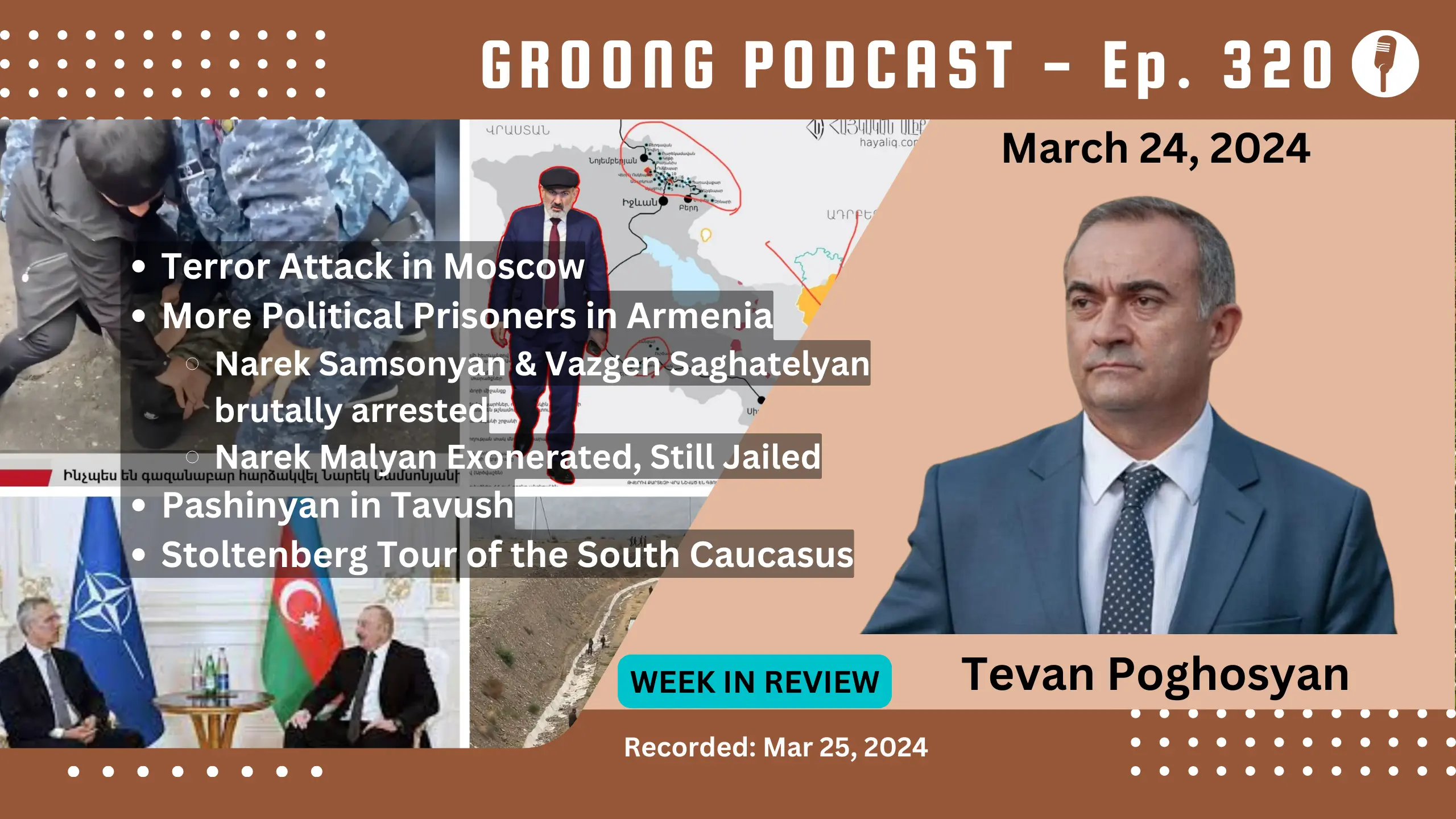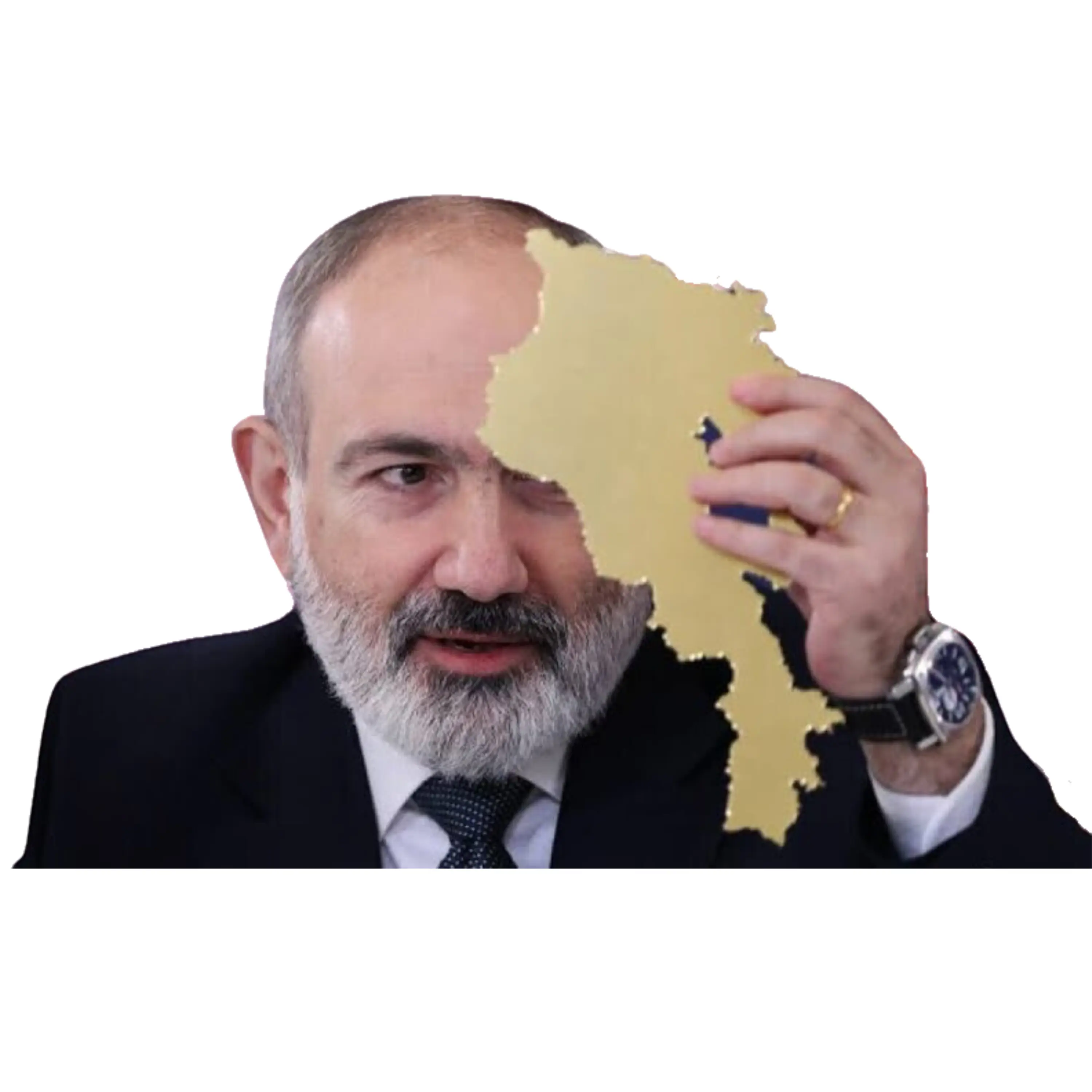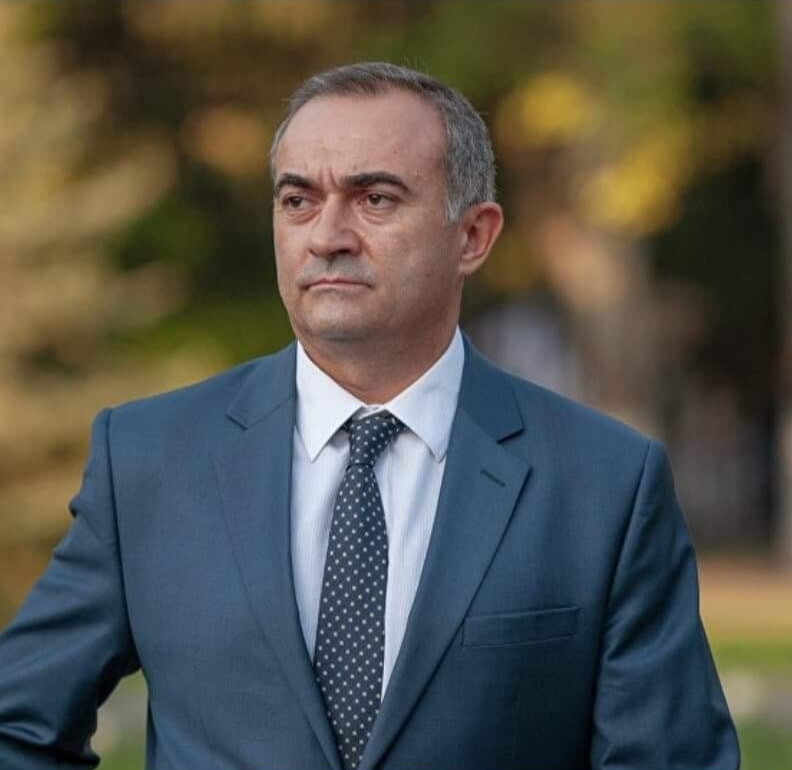
Groong Links:
Guest:
Topics:
- Terror Attack in Moscow
- Growing List of Political Prisoners in Armenia
- Narek Samsonyan & Vazgen Saghatelyan brutally arrested
- Narek Malyan Exonerated, Remains Jailed
- Pashinyan in Tavush
- Stoltenberg’s in the South Caucasus
Episode 320 | Recorded: March 25, 2024
Show Notes
Terror Attack in Moscow
On Friday night four terrorists attacked a concert hall in Moscow called the Crocus City Hall. At present the death toll stands at 137, and is expected to rise. The gunmen opened fire on the audience and set the building on fire. Atrocities were also committed.
The Islamic terrorist group ISIS claimed responsibility for the attack, but details remain sketchy. On Saturday, president Putin declared that the four gunmen were apprehended as they fled towards Ukraine, and claimed that an escape “window” was prepared for the gunmen across the border in Ukraine. After questioning the gunmen reportedly confessed to be Tajiks who had transited through Turkey before reaching their destination.
At present there are reports that earlier in March the US had warned Russia of a potential strike, and warned its citizens to avoid crowded areas until further notice.
And also, the media outlet TV Rain (Дождь - Dozhd), which is operated from exile and declared a “foreign agent” in Russia, quoted an anonymous eyewitness who claimed that the attackers spoke to each other in Armenian. The TV station later apologized in the wake of the Tajik terrorists’ confessions, which put Turkey squarely in the limelight of Russia’s scrutiny.
So far as we know, there were at least two Armenians among the victims.
Questions:
- Where did the Armenian story come from on Dozhd?
- The US and Russia continue to maintain a backchannel, to inform each other of potential terror attacks. Is it likely that Russia ignored US intel warnings about this attack?
- How could Turkish and Russian intel miss something like this?
Political Prisoners Grow In Armenia
Narek Samsonyan and Vazgen Saghatelyan
Two podcasters, Narek Samsonyan and Vazgen Saghatelyan were arrested Saturday morning, from their homes, in one of the most brutal ways possible. An entire law enforcement squad, some in civilian clothing while others in uniforms and facemasks, smashed Narek Samsonyan to the ground, pushing his face on the asphalt.
Again, both of them were arrested from their homes and they did not appear to resist the arrest. Even some of the Moscow terrorists seem to have received a less violent treatment.
So what was their crime? Terrorism? Murder? Rape? Corruption?
It just so happens that their podcast, which is critical of Pashinyan, is getting extremely popular nowadays. And we have to warn you, they sometimes resort to strong language. What did they call him that triggered Pashinyan? Was it “son of a bitch”?
Later in the day, when the authorities provided a clarification and “smoking gun evidence”, they apparently referred to the Imnemnimi podcast Episode 83 of March 20, the segment between 00:10 and 00:50 minutes. We weren’t able to find anything in those segments other than calling a spade a spade.
But officially, it seems that the crime is “hooliganism”, apparently conducted via Youtube. So we asked ChatGPT, you know the one that passed the bar exam, what is hooliganism:
_“Hooliganism in post-Soviet countries typically refers to acts of violence, vandalism, or disorderly conduct, often associated with football (soccer) matches or other large public gatherings. These laws are aimed at maintaining public order and safety, combating hooligan behavior that can lead to property damage, injuries, or even fatalities.”_
Apparently, the prosecutors and defense attorneys were arguing whether Youtube viewers have the agency to simply change the channel or were viewers forced to experience this “public disorder”.
Questions:
- How can public order be disturbed (which is the implication for a hooliganism charge) by a Youtube live video?
- Did they call for violence? Did they commit illegal acts?
- Where is the so-called “civil society”?
Narek Malyan exonerated on one case, but still in jail on another
Narek Malyan, an opposition activist, faces harassment from the government through frivolous prosecutions and pretrial detention.
One of his cases, for which he is in detention now, involves his Facebook posts following the handover of Artsakh after the 1-day war in September 2023.
Another case, the “Ceaușescu case”, saw him charged for public calls to violence, because Malyan organized a “futuristic” staging of Nicolae Ceaușescu’s execution during protests. Despite being exonerated by first instance courts in 2023, authorities appealed the decision. This week, the court of appeals upheld his exoneration.
Despite this, Malyan remains detained on what appears to be another frivolous charge. Diplomatic responses to questions about political prisoners in Armenia often evade clear acknowledgment of such cases.
Western ambassadors normally provide very diplomatic and evasive answers when it comes to political prisoners in Armenia. Famously, when former EU ambassador Andrea Wiktorin was questioned about this, in a conference where the Armenian opposition was prevented from attending, as protesters were chanting outside, Wiktorin proceeded to praise Armenia’s “democracy”.
And apparently we don’t have a single person in Armenia whom the west clearly believes is a political prisoner.
Questions:
- Are you familiar with the case of Narek Malyan? Do you believe there are political prisoners in Armenia?
- How is Pashinyan getting away with this? Where are the condemnations from Western embassies? Why do you think western embassies are so hesitant to call him out?
Fearmongering by Pashinyan and Repercussions
Pashinyan visited Tavush. He took with him this cutout piece of plastic he calls Armenia.

Apparently all the emotional and controversial stuff was edited out, but from what we understood of the videos released by his team, he continued to make the case for ceding those villages.
He said:
- That Armenia will receive a strong “invisible” wall of legitimacy
- There will be war “by the end of the week” if we don’t do this.
- There were media reports, we don’t have this on video, that he also raised the specter of Turkey attacking Armenia from the East in tandem with Azerbaijan.
- If war is allowed to happen, he indicates that the outcome will be known.
He also said that everyone would be handsomely compensated.
Questions:
- What are the risks of Armenia pulling back from the territories that Pashinyan wants to give away? What is the “wall of legitimacy” that he is talking about?
- Does Azerbaijan even recognize the territories beyond those 4 villages as Armenian?
Stoltenberg Tour
This past week NATO SecGen Jens Stoltenberg toured the South Caucasus, probably timed to come on the heels of Putin’s new term in office. First stop was Azerbaijan, then Georgia, then Armenia.
In Baku Stoltenberg emphasized energy and security cooperation with NATO as key issues, completely ignoring Artsakh or even the recent so-called “elections” where Aliyev got 200% of the vote. In Tbilisi, Stoltenberg amped up his anti-Russian rhetoric and partnership with NATO. In Yerevan, still officially a member of CSTO and partner to Russia, it was all about “democracy”, “peace” and how Russia must not win in Ukraine.
In Baku:
- Did not say a word about about human rights
- Not a word about ethnic cleansing
- Not a word about rights of Artsakhtsis
- Not a word about democracy or Aliyev’s fake “re-election”
- He discussed “energy security” for NATO allies
- He encouraged Azerbaijan to seize the opportunity to reach a lasting peace agreement with Armenia
- He welcomed Azerbaijan’s support for Ukraine
- He welcomed deeper relations of Azerbaijan with Turkey, and therefore NATO
- The day after Aliyev goes to Stepanakert and does a “Novruz” bonfire cleaning
In Georgia:
- Expressed commitment to assisting with Georgia’s path toward “greater democracy”
- Noted on NATO’s 2008 declaration that Georgia would one day be a member state.
In Armenia:
- Expressed hope for a framework for closer NATO-Armenia cooperation
- Praised Armenia for sending humanitarian aid to Ukraine (last year) and welcomed Pashinyan’s solidarity on Ukraine. He also highlighted that Putin must not be allowed to succeed.
- Expressed support for Armenia’s sovereignty and territorial integrity
- Expressed support for Armenia’s efforts to develop a “more independent foreign policy”, meaning “anti-Russian”
- Expressed hope for the swift development of an Individually Tailored Partnership Program for Armenia.
Questions:
- Why was Stoltenberg touring the South Caucasus right after Putin’s re-election?
- How did his messages differ from capital to capital?
- Combining his various messages from the three capitals, what should we be hearing as his overall message from NATO?
Topics from the Panelists
- Tevan: Keep Artsakh in your minds and do not give up on it
- Hovik: Western diplomats who do not acknowledge and defend political prisoners in Armenia
Wrap-up
That’s our Week in Review, we hope you found it helpful. We invite your feedback and your suggestions, you can find us on most social media and podcast platforms. Thanks to Laura Osborn for the music on our podcasts.
Guests

Tevan Poghosyan
Tevan Poghosyan is president of the International Center for Human Development. Mr. Poghosyan was an MP in the National Assembly between 2012 and 2017 from the Heritage party. From 1997 to 1999 he served as the Nagorno-Karabakh Public Affairs Office Director in Washington, D.C.
Hosts

Hovik Manucharyan
Hovik Manucharyan is an information security engineer who moved from Seattle to Armenia in 2022. He co-founded the ANN/Groong podcast in 2020 and has been a contributor to Groong News since the late 1990s.
Disclaimer: The views expressed by Hovik Manucharyan on the ANN/Groong podcast are his own and do not necessarily reflect the opinions of his employer or any other organization.

Asbed Bedrossian
Asbed Bedrossian is an IT professional, and for years oversaw the central IT enterprise infrastructure and services at USC. His decades of experience spanned across IT strategy, enterprise architecture, infrastructure, cybersecurity, enterprise applications, data center operations, high performance computing, ITSM, ITPM, and more.
Asbed founded the Armenian News Network Groong circa 1989/1990, and co-founded the ANN/Groong podcast in 2020.